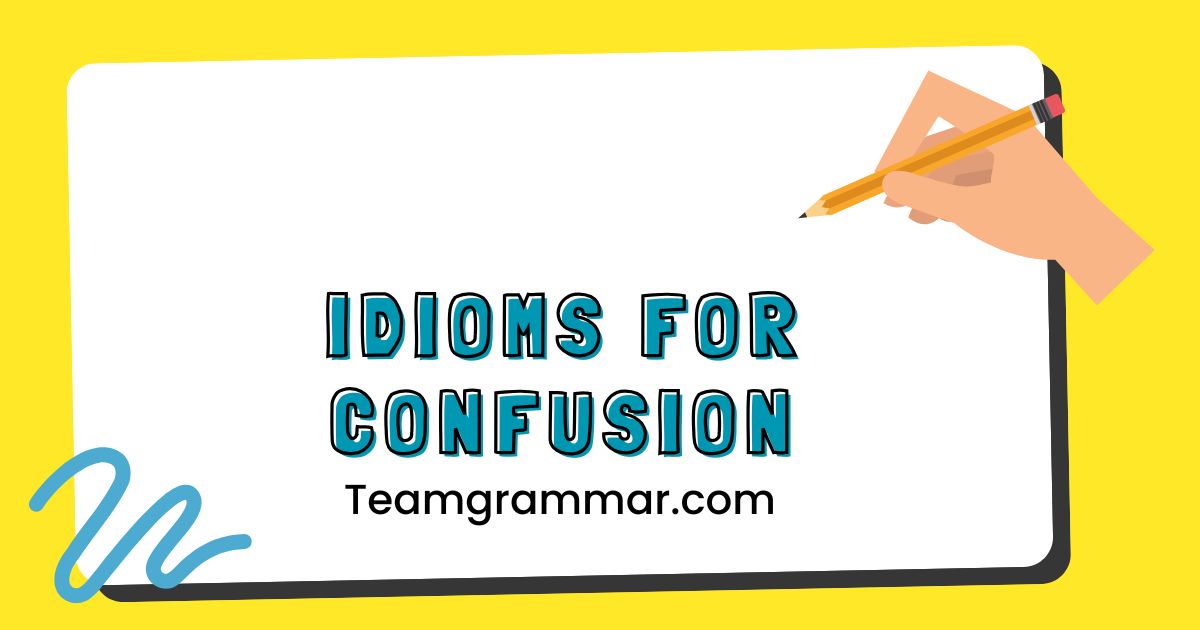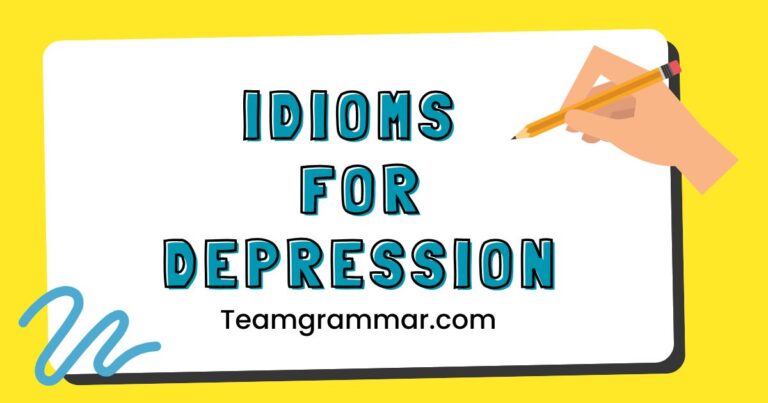33 Idioms for Confusion: Mastering Figurative Language
Idioms are an integral part of the English language, adding color and nuance to everyday conversations and writing. Mastering idioms, especially those related to confusion, is essential for both understanding and expressing oneself effectively.
This article provides a comprehensive guide to idioms that describe confusion, helping learners grasp their meanings, usage, and common pitfalls. Whether you’re an ESL student, a writer looking to enrich your prose, or simply someone interested in expanding your linguistic repertoire, this guide will equip you with the knowledge and tools to confidently navigate the world of idioms.
Table of Contents
- Introduction
- Definition of Idioms for Confusion
- Structural Breakdown
- Types and Categories of Idioms for Confusion
- Examples of Idioms for Confusion
- Usage Rules
- Common Mistakes
- Practice Exercises
- Advanced Topics
- FAQ
- Conclusion
Introduction
Idioms are expressions whose meanings cannot be understood from the literal definitions of the individual words. They are a vital component of the English language, adding richness and depth to communication.
Understanding idioms related to confusion is particularly important, as they allow speakers and writers to convey complex feelings of bewilderment, uncertainty, and disorientation in a concise and evocative manner. This article aims to provide a thorough exploration of these idioms, enabling learners to confidently use them in various contexts.
By delving into their meanings, structures, and usage rules, this guide will help readers enhance their comprehension and fluency in English.
Definition of Idioms for Confusion
Idioms for confusionare figurative expressions used to describe a state of mental uncertainty, bewilderment, or lack of clarity. These idioms often employ metaphors or similes to convey the feeling of being lost, disoriented, or unable to understand a situation.
Unlike literal phrases, the meaning of an idiom cannot be derived from the individual words it contains. Instead, the idiom functions as a single unit of meaning, requiring learners to understand its specific, often culturally-bound, interpretation.
These idioms play a crucial role in expressing subtle nuances of confusion that literal language might fail to capture.
Classification
Idioms for confusion can be classified based on their underlying metaphors or the specific type of confusion they describe. Some idioms relate to being lost or disoriented, while others focus on a lack of understanding or mental fog.
Additionally, idioms can be categorized by their level of formality, ranging from colloquial expressions to more formal and literary phrases.
Function
The primary function of idioms for confusion is to express a state of mental uncertainty or bewilderment in a concise and evocative way. They allow speakers and writers to convey the intensity of their confusion and add color to their language.
Idioms can also serve to soften potentially harsh statements or to inject humor into a situation.
Contexts
Idioms for confusion are used in a wide range of contexts, from casual conversations to formal writing. They can be found in literature, journalism, business communication, and everyday speech.
The specific idiom used will often depend on the audience, the level of formality, and the specific nuance of confusion that the speaker or writer wishes to convey.
Structural Breakdown
The structure of idioms for confusion varies widely, reflecting the diverse nature of the English language. Some idioms are simple phrases consisting of a few words, while others are more complex sentences.
Many idioms incorporate prepositions, verbs, and nouns in unique combinations that contribute to their figurative meaning. Understanding the structural elements of idioms can help learners to better grasp their overall meaning and usage.
One common structural pattern involves the use of metaphors, where confusion is likened to a physical state or object. For example, the idiom “to be in a fog” uses the metaphor of a fog to represent a state of mental obscurity.
Similarly, the idiom “to be at sea” uses the image of being lost at sea to convey a feeling of disorientation and uncertainty.
Another structural pattern involves the use of similes, where confusion is compared to something else using words like “like” or “as.” For example, the idiom “as clear as mud” uses a simile to sarcastically describe something that is not clear at all.
Finally, some idioms for confusion rely on idiomatic verb phrases, where the meaning of the verb changes when combined with a specific preposition or adverb. For example, the verb “to lose” takes on a figurative meaning in the idiom “to lose one’s bearings,” which means to become disoriented or confused.
Types and Categories of Idioms for Confusion
Idioms for confusion can be grouped into several categories based on the specific type of confusion they describe. These categories include idioms that express a general state of bewilderment, idioms that describe a lack of understanding, idioms that relate to disorientation, and idioms that convey a sense of mental fog.
General Bewilderment
These idioms describe a general state of confusion or perplexity, without specifying the exact cause or nature of the confusion. They often convey a feeling of being overwhelmed or unsure of what to do.
Lack of Understanding
These idioms focus on a specific lack of comprehension or inability to grasp a concept or situation. They often imply that something is too complex or unclear to be understood.
Disorientation
These idioms describe a feeling of being lost or disoriented, either physically or mentally. They often convey a sense of being out of place or unable to find one’s way.
Mental Fog
These idioms depict a state of mental obscurity or cloudiness, where thinking is difficult and clarity is lacking. They often imply that someone is tired, stressed, or under the influence of something.
Examples of Idioms for Confusion
This section provides extensive examples of idioms for confusion, organized by category. Each example is accompanied by a definition and a sample sentence to illustrate its usage.
General Bewilderment Examples
The following table provides examples of idioms that express general bewilderment.
| Idiom | Definition | Example Sentence |
|---|---|---|
| In a fog | Confused and disoriented | After the accident, he was in a fog for several days. |
| At sea | Confused and uncertain | I’m completely at sea with these new regulations. |
| All over the place | Disorganized and confused | His ideas were all over the place during the meeting. |
| Like a deer in headlights | Confused and unable to react | When the teacher called on him, he just stood there like a deer in headlights. |
| Lost in the sauce | Confused and overwhelmed, especially in a complex situation. | He got completely lost in the sauce trying to manage the project’s finances. |
| Baffled | Totally perplexed and confused. | The detective was baffled by the lack of evidence at the crime scene. |
| Bewildered | Deeply confused and puzzled. | She looked bewildered when they told her the surprise party was for her. |
| Discombobulated | Confused and disconcerted. | Waking up from the surgery, he felt completely discombobulated. |
| Flustered | Nervously confused and agitated. | She became flustered when she realized she had forgotten her presentation notes. |
| Muddled | Confused and disorganized. | His thoughts were muddled after the long, sleepless night. |
| In a daze | Confused and unable to think clearly. | He wandered around in a daze after hearing the shocking news. |
| Mixed up | Confused and uncertain. | I got the dates mixed up and missed the appointment. |
| At sixes and sevens | In a state of confusion and disorder. | Since the new system was implemented, everyone has been at sixes and sevens. |
| In a muddle | In a confused and disorganized state. | The files were in a muddle after the office relocation. |
| Throw someone for a loop | To confuse or surprise someone greatly. | The sudden change in plans really threw me for a loop. |
| Make head nor tail of something | To be unable to understand something at all. | I couldn’t make head nor tail of the instructions. |
| Be out of it | Confused and not fully aware of what is happening. | He was completely out of it after taking the medication. |
| In the dark | Uninformed and confused. | Management kept us in the dark about the company’s financial problems. |
| Off beam | Mistaken or confused. | His calculations were completely off beam. |
| Out to lunch | Not paying attention or thinking clearly. | He seems a bit out to lunch today. |
Lack of Understanding Examples
The following table provides examples of idioms that describe a lack of understanding.
| Idiom | Definition | Example Sentence |
|---|---|---|
| Clear as mud | Not clear at all; confusing | The instructions were as clear as mud. |
| Greek to me | Completely incomprehensible | The technical jargon was Greek to me. |
| Over my head | Too difficult to understand | The lecture went completely over my head. |
| Can’t wrap my head around it | Unable to understand something | I just can’t wrap my head around this new concept. |
| Lost in translation | Meaning is not conveyed accurately | Some of the humor was lost in translation. |
| Not have a clue | To have no idea about something. | I don’t have a clue what he’s talking about. |
| Boggles the mind | To be difficult to imagine or understand. | The sheer scale of the project boggles the mind. |
| Beyond me | Impossible for someone to understand. | Quantum physics is completely beyond me. |
| Doesn’t ring a bell | Something that is unfamiliar or not remembered. | That name doesn’t ring a bell. |
| Leaves me speechless | Surprises or confuses someone to the point of not being able to speak. | His behavior leaves me speechless. |
| Puzzling | Confusing and difficult to understand. | The whole situation is quite puzzling. |
| A mystery | Something that is difficult or impossible to understand or explain. | How the thief got in remains a mystery. |
| Not know the first thing about it | To know absolutely nothing about something. | I don’t know the first thing about car repair. |
| Confuses me | To cause someone to become bewildered or perplexed. | The complexity of the problem confuses me. |
| Perplexing | Completely baffling; very puzzling. | The origins of the universe are perplexing. |
| I’m drawing a blank | Unable to remember something. | I’m drawing a blank on his name. |
| It’s all double Dutch to me | Something that is incomprehensible. | The technical jargon was all double Dutch to me. |
| Foggy idea | A vague or unclear notion. | I have only a foggy idea of what happened. |
| Mind-boggling | Overwhelmingly complex or surprising. | The amount of data involved is mind-boggling. |
| Lost for words | So surprised or confused that you cannot think what to say. | I was lost for words when I heard the news. |
Disorientation Examples
The following table provides examples of idioms that relate to disorientation.
| Idiom | Definition | Example Sentence |
|---|---|---|
| Lose one’s bearings | Become disoriented or confused about one’s location or situation | After wandering in the woods for hours, he lost his bearings. |
| Turned around | Confused about one’s location or direction | I got turned around in the city and had to ask for directions. |
| Off track | Diverted from the intended course or plan | We got off track during the discussion and started talking about unrelated topics. |
| Taken aback | Surprised and confused by something unexpected | I was completely taken aback by her sudden outburst. |
| Knocked for a loop | To be shocked or disoriented. | The news of his resignation knocked me for a loop. |
| Lost the plot | To become confused or irrational. | He’s completely lost the plot. |
| Get one’s wires crossed | To become confused about something. | I think we got our wires crossed somewhere. |
| Thrown off balance | To be made unsteady or confused. | The sudden question threw her off balance. |
| Out of sync | Not coordinated or in agreement. | Our schedules are completely out of sync. |
| At a loss | Unsure of what to do or say. | I’m at a loss for words. |
| Disoriented | Confused about time, place, and identity. | The patient was disoriented after waking up from surgery. |
| Head spinning | Feeling dizzy and confused. | So much information made my head spin. |
| Not knowing if one is coming or going | To be extremely confused and disorganized. | I don’t know if I’m coming or going with all these changes. |
| In a spin | To be agitated and confused. | She’s been in a spin ever since she lost her keys. |
| In the wrong place | To feel out of place and confused. | I felt like I was in the wrong place at the party. |
| Going around in circles | To be doing something without making progress. | We’re just going around in circles with this project. |
| Out of sorts | Slightly unwell or unhappy. | I’ve been feeling out of sorts all day. |
| Rattled | Nervous, worried, or upset. | The unexpected news left me rattled. |
| Shaken up | Emotionally upset or confused. | She was shaken up by the accident. |
| On the wrong track | Following a course of action that is unlikely to lead to the desired result. | You’re on the wrong track if you think he’s guilty. |
Mental Fog Examples
The following table provides examples of idioms that convey a sense of mental fog.
| Idiom | Definition | Example Sentence |
|---|---|---|
| Brain is fried | Unable to think clearly due to exhaustion or stress | After studying for 12 hours, my brain is completely fried. |
| Mind went blank | Unable to remember something | When the teacher asked me the question, my mind went blank. |
| Space out | Become inattentive or detached from one’s surroundings | I tend to space out during long meetings. |
| Out of one’s mind | Crazy, insane, or not thinking clearly | You must be out of your mind to try that! |
| Brain fart | A temporary mental lapse or failure to recall something | I had a total brain fart and forgot her name. |
| Not all there | Not fully alert or mentally present. | He’s not all there today; he must be tired. |
| In a stupor | A state of near-unconsciousness or insensibility. | He was in a stupor after taking the strong painkillers. |
| Clouded judgment | Impaired ability to make sound decisions. | His judgment was clouded by alcohol. |
| Hazy memory | A vague or unclear recollection of something. | I have only a hazy memory of that day. |
| Foggy brain | A state of mental confusion or lack of clarity. | I have a foggy brain after a sleepless night. |
| Woolgathering | Indulging in daydreaming or fanciful musing. | Stop woolgathering and pay attention to the lecture. |
| Scatterbrained | Disorganized and lacking concentration. | She’s always been a bit scatterbrained. |
| In a haze | A state of mental confusion or lack of clarity. | She was in a haze after the shock. |
| Addled | Confused and unable to think clearly. | His brain was addled by the heat. |
| Dithering | Being indecisive and confused. | Stop dithering and make a decision. |
| Blanked out | Unable to remember or think clearly. | I completely blanked out during the exam. |
| Space cadet | A person who is absent-minded or out of touch with reality. | He’s such a space cadet. |
| Light-headed | Feeling faint and dizzy. | I felt light-headed after skipping breakfast. |
| Groggy | Dazed, weak, or unsteady, especially from illness or sleep. | I felt groggy after waking up. |
| Muzzy | Confused or unclear in thought. | My head feels muzzy this morning. |
Usage Rules
Using idioms correctly requires an understanding of their specific meanings and contexts. While idioms can add color and expressiveness to language, using them inappropriately can lead to confusion or miscommunication.
Here are some key usage rules to keep in mind:
- Understand the meaning: Before using an idiom, make sure you fully understand its meaning and connotations.
- Consider the context: Choose idioms that are appropriate for the context and audience. Avoid using overly informal or colloquial idioms in formal settings.
- Use idioms sparingly: Overusing idioms can make your language sound unnatural or forced. Use them judiciously to enhance your message.
- Be aware of regional variations: Some idioms are specific to certain regions or dialects. Be mindful of your audience and choose idioms that are widely understood.
- Avoid mixing idioms: Mixing idioms can create nonsensical or humorous effects, but it is generally best to avoid doing so unintentionally.
Common Mistakes
Learners often make mistakes when using idioms for confusion, due to their figurative nature and cultural context. Here are some common errors to avoid:
| Incorrect | Correct | Explanation |
|---|---|---|
| I’m in a soup with this problem. | I’m in a fog with this problem. | “In a fog” is the correct idiom for feeling confused. |
| The instructions were clear as water. | The instructions were clear as mud. | “Clear as mud” is the idiom used to sarcastically describe unclear instructions. |
| I lost my roads in the city. | I lost my bearings in the city. | “Lost my bearings” is the correct idiom for becoming disoriented. |
| He is all his place. | He is all over the place. | ‘All over the place’ is correct to indicate disorganization. |
| She is like a deer with headlights. | She is like a deer in headlights. | The preposition ‘in’ is necessary for the correct idiom. |
Practice Exercises
Test your understanding of idioms for confusion with these practice exercises. Choose the correct idiom to complete each sentence.
Exercise 1
| Question | Options | Answer |
|---|---|---|
| After the loud noise, I was completely __________. | a) at sea, b) in the river, c) on the land | a) at sea |
| The technical jargon was __________ to me. | a) English, b) Greek, c) Spanish | b) Greek |
| I can’t __________ this new concept. | a) wrap my head around, b) use my head around, c) find my head around | a) wrap my head around |
| After working all night, my __________ is fried. | a) foot, b) hand, c) brain | c) brain |
| I __________ and forgot her name. | a) mind went full, b) mind went blank, c) mind went dark | b) mind went blank |
| He’s completely __________; he needs a break. | a) lost the planet, b) lost the city, c) lost the plot | c) lost the plot |
| The complex instructions were __________ to understand. | a) clear as water, b) clear as sky, c) clear as mud | c) clear as mud |
| I’m __________ for what to say next. | a) at a loss, b) at a gain, c) at a win | a) at a loss |
| The sudden change of plans really __________ me __________. | a) threw, for a loop, b) caught, for a loop, c) made, for a loop | a) threw, for a loop |
| I __________ during long meetings. | a) space in, b) space over, c) space out | c) space out |
Exercise 2
Fill in the blanks with the appropriate idiom:
| Question | Answer |
|---|---|
| I was so surprised by the news, I was completely __________. | taken aback |
| The files were a complete __________ after the storm. | muddle |
| After hours of debate, we were just __________. | going around in circles |
| He seems a bit __________ today; I wonder what’s wrong. | out to lunch |
| The amount of data involved is truly __________. | mind-boggling |
| After the accident, he was wandering around __________. | in a daze |
| I couldn’t __________ of the instructions. | make head nor tail |
| The sheer scale of the project __________. | boggles the mind |
| I have a __________ idea of what happened that night. | foggy |
| He’s been __________ ever since the incident. | rattled |
Advanced Topics
For advanced learners, exploring the etymology and cultural context of idioms can provide a deeper understanding of their meanings and usage. Researching the origins of idioms can reveal fascinating insights into the history of the English language and the cultural values that have shaped its development.
Additionally, studying the use of idioms in literature and other forms of media can enhance one’s appreciation for the art of language.
Another advanced topic is the study of idioms across different dialects and varieties of English. Idioms can vary significantly from one region to another, reflecting the unique cultural and linguistic characteristics of each area.
Understanding these variations is essential for effective communication in a globalized world.
FAQ
- What is an idiom?
An idiom is a phrase or expression whose meaning cannot be understood from the literal meanings of its individual words. It functions as a single unit of meaning, often conveying a figurative or metaphorical sense.
- Why are idioms important?
Idioms add color, depth, and nuance to language. They allow speakers and writers to express complex ideas and emotions in a concise and evocative way. Understanding idioms is essential for effective communication and comprehension.
- How can I learn idioms effectively?
Learn idioms in context by reading books, watching movies, and listening to native speakers. Keep a vocabulary notebook and record new idioms along with their definitions and examples. Practice using idioms in your own speech and writing.
- Are idioms the same in all dialects of English?
No, idioms can vary significantly from one dialect of English to another. Some idioms are specific to certain regions or cultures. It’s important to be aware of these variations and choose idioms that are appropriate for your audience.
- Can I create my own idioms?
While it is possible to create new idioms, they may not be widely understood or accepted. Idioms typically evolve over time and gain currency through repeated use. It’s generally best to use established idioms that are already recognized by native speakers.
- What is the difference between an idiom and a proverb?
An idiom is a phrase whose meaning is not literal, while a proverb is a short, well-known saying that expresses a general truth or piece of advice. Proverbs often have a moral or philosophical message, while idioms are primarily used to add color and expressiveness to language.
- How do I know when to use an idiom?
Use idioms when they enhance your message and are appropriate for the context and audience. Avoid using idioms that are too informal or obscure. If you’re unsure whether an idiom is appropriate, it’s best to err on the side of caution and use more literal language.
- What should I do if I don’t understand an idiom?
Look up the idiom in a dictionary or online resource. Pay attention to the context in which the idiom is used to get a better sense of its meaning. Ask a native speaker for clarification if you’re still unsure.
- Why are idioms so confusing?
Idioms are confusing because their meanings are not literal and often rely on cultural or historical context. Understanding idioms requires familiarity with the figurative nature of language and the specific cultural references that they embody.
- Are there resources for learning idioms?
Yes, there are many resources available for learning idioms, including dictionaries, textbooks, websites, and mobile apps. Look for resources that provide clear definitions, examples, and practice exercises.
Conclusion
Mastering idioms for confusion is a valuable skill for anyone seeking to improve their English language proficiency. By understanding the meanings, structures, and usage rules of these idioms, learners can express themselves more effectively and confidently in a variety of contexts.
This article has provided a comprehensive guide to idioms for confusion, covering their definition, classification, examples, usage rules, common mistakes, and practice exercises. Remember to use idioms judiciously, considering the context and audience, and to continue expanding your knowledge through ongoing learning and practice.
With dedication and effort, you can unlock the power of idioms and enhance your communication skills.







